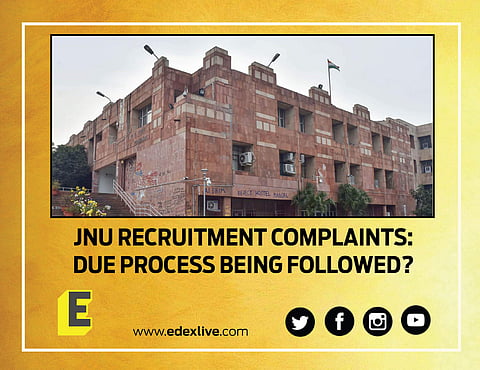

Faculty recruitments at the Jawaharlal Nehru University have been a contentious issue for the past few years. From time to time, allegations of under-qualified recruitments to names cropping up in the final list without the selection committee's know-how — the teachers have been protesting against it all. But what was the result of all these letters to the Ministry of Education and the administration?
Zilch, say the professors, some of whom have written to President Ram Nath Kovind, the Visitor of the varsity recently. Interestingly, there were quite a few cases where there has been no official complaint sent to the administration.
The professors from the School of Physical Sciences (SPS) recently wrote to the President of India, about their concerns regarding the recruitment at the Physics department. "The people who have been selected do not fit the required profile. We had some great applicants including a Bhatnagar Prize winner for the post of a Professor but the selection committee recommended someone who does not even have a decade of experience. For the post of the Associate Professor (OBC), a name was added at the last moment and that person was selected. For another post of an Associate Professor (OBC), the person rejected by the screening committee on the grounds of lack of experience was called to the interview and selected. The IQAC, which cross-checks documents submitted by the applicant, even pressurised the committee members," said one of the signatories. "This will degrade the culture of the school and the centre. We have had a highly acclaimed faculty but irregularities such as these are a threat to that. Why will young, talented researchers want to join a place like this?" they asked.
Leapfrogging over the VC's head?
But the teachers did not raise a direct complaint to the dean or the VC. They wrote to the highest authority of the university. "We decided to write to the President because we had no faith in what the administration would do. The top officials are a part of this. What would be the use of an enquiry on them by themselves?" asked the senior professor.
What the above-mentioned professor is scared about has happened previously, confirmed another senior professor from the School of Social Sciences (SSS). There were complaints filed against the recruitment of Dr Saurabh Sharma, who had allegedly been appointed even though his name was not recommended by the shortlisting committee last year. Edex was able to access an email that was written to the Registrar and the VC earlier this year, requesting the Executive Committee to defer Dr Sharma's appointment. "But there was no discussion on this at the EC," said an EC member.
What can the EC do?
But there are cases which have found their way to the EC discussion. A review committee was constituted to look into the appointment of one Dr Amit Singh in the Special Centre for National Security Studies. But the EC asked the committee to reconsider the report and added Dr Ashwini Mahapatra and Sameer Sharma to the committee. "They ignored the report and asked the committee to submit another report. This only shows that they are not going to act on the issue," added the professors.
The case of Dr Singh was not a one-off incident. there were committees formed to look into the plagiarism allegations against Dr Sonu Trivedi and the appointment of Dr Suchi Yadav, whose name allegedly was laterally added to the list but was not selected by the committee. While in Dr Trivedi's case the matter was referred to the UGC, Dr Yadav's appointment was notified after deliberation by the EC.
What does the law say?
While the statutes of the university do not clearly mention the procedure for redressal in such cases, there is a three-tier grievance redressal system in place which will address teachers' individual and collective complaints. The first stage is the School Level Grievance Redressal Committee which has the Dean of the School, Dean from another School, a senior professor and an administrative officer. If there are grievances that are on the university level or if the complainants are not satisfied with the decision of the School Level Committee, they can approach the University Level Grievance Redressal Committee which will have the Rector-I, three Deans and one professor from the School chosen by the VC and the Deputy Registrar. If the complainants are still not satisfied they can appeal to the Vice-Chancellor within 30 days. "The Vice-Chancellor, keeping in view his engagements, may dispose of the appeal within 4-6 weeks time. The decision of the Vice-Chancellor, in such matters, shall be final and there shall be no further appeal in the matter," reads the document on the website.
But there is no process of redressal for policy matters, said a senior professor. "While the grievance redressal system is in place, the least the VC can do is address these issues when they are raised at the EC or a professor writes to him with apprehensions that there might be unscrupulous activities regarding faculty recruitment going on," they added.
While there have been lapses in cases like Dr Sharma's where the teachers claim there have been no steps taken even though they had written to the Registrar and the VC, there are other cases where the teachers did not file an official complaint — the most common reason stated was a lack of faith in the administration. There are a few cases in court which are under trial against some of the appointments. One would only have to wait and watch how the Visitor reacts to the letter from the Physics professors and whether he forwards it to the Education Ministry as soon as he can.
